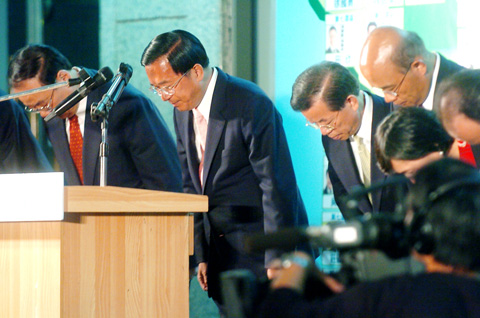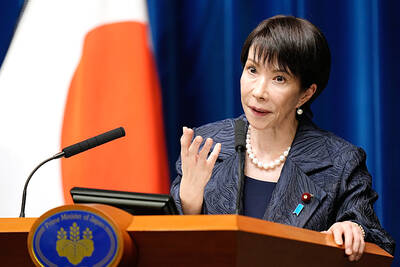The Chen Shui-bian (陳水扁) era ends tomorrow at 9am. While it may require the passage of time to objectively assess his two terms in office, most agree that it was an eventful and historically important eight years.
Chen and Vice President Annette Lu (呂秀蓮), both born in Taiwan, won the election in 2000. Despite being reputed to hold a hard-line stance on Taiwan’s independence, Chen tried to adopt a “new middle way” in the beginning of his term and offered to resume cross-strait talks under the 1992 spirit of bilateral communication. But Beijing’s rejection of his offer compelled Chen to revert to his old strategy.
Pressured by Beijing and opposition at home, Chen was forced to fight for political survival. And once he took this road, there was no turning back.

Chao Yung-mau, political science professor at National Taiwan Un
Stephen Yates, president of DC Asia Advisory, a Washington-based consulting firm, said Chen would go down in history as the first president to govern Taiwan with a divided government.
“No one imagined in 2000 just how divided it was and would remain throughout Chen’s time in office,” Yates said.
Opposition vigorously challenged the legitimacy of Chen’s election victories and engaged in highly partisan cross-strait diplomacy, undermining his stature and influence as president.
Yates suggested that while Chen may have brought many difficulties on himself, “it is also true that the structural and partisan obstacles he faced would have challenged the most gifted politician.”
Political analyst Antonio Chiang (江春男), former Taipei Times editor-in-chief and former National Security Council deputy secretary-general, said that Chen’s biggest achievements were strengthening Taiwan-centered consciousness, national identity and values such as democracy, freedom and human rights.
Democracy took a new form under Chen’s presidency, expanding from political democracy to community democracy, “environmental democracy” and direct democracy, Chiang said.
The status of ethnic groups such as Hakkas and Aboriginals also improved and multi-culturalism was respected, he said.
Despite political differences, cross-strait relations were peaceful and exchanges were vibrant, he said.
According to the annual report released on April 30 by the US-based Freedom House, Taiwan’s media environment is the freest in East Asia and No. 32 worldwide.
The report, which rated 195 countries and territories, attributed Taiwan’s good performance to a commitment to judicial independence, economic freedom and a highly competitive media market.
In addition to strengthening Taiwan-centered consciousness, Liu Shih-chung (劉世忠), a former close aide to Chen, said that Chen deserved credit for institutionalizing referendums and nationalizing the armed forces, which was previously used as the military arm of the Chinese Nationalist Party (KMT).
Liu, former deputy chief of the Ministry of Foreign Affairs’ Research and Planning Committee, also commended Chen’s efforts in developing personal relationships with the leaders of Taiwan’s diplomatic allies.
But the DPP administration waited too long to tackle the issue of transitional justice, Chiang said.
Transitional justice refers to a range of approaches that states undertake to deal with legacies of widespread or systematic human rights abuse as the nation moves from a period of violent conflict or oppression toward democracy, the rule of law and respect for individual and collective rights.
The DPP administration not only did too little, but also did it poorly in terms of strategy, Chiang said.
Lu, a political prisoner during the KMT era, agreed. In an interview with the Taipei Times on Saturday, she said the issue of transitional justice was one area the DPP administration didn’t tackle effectively.
As a result, many questions concerning the “Formosa Incident” and “228 Massacre” remain unanswered, the vice president said.
Chiang said the DPP administration was more reformed-minded and motivated during Chen’s first term because they wanted to win re-election.
But reforms lost momentum during the second term and its energy was lost on its struggle for survival, he said.
At times the administration has appeared tired — even lost — especially in the later stages when Chen faced harsh criticism over corruption charges implicating his family and close aides, he said.
Power made people corrupt and arrogant, Chiang said, adding that this was typical of second-term presidencies. Corruption was not as bad as it was during the KMT era, but the Chen administration lost touch with the people, he said.
Echoing Chiang’s view, Liu said that corruption was the Chen administration’s biggest failure and that the DPP paid a high price for it.
Chao Yung-mau (趙永茂), a political science professor at National Taiwan University, said one of Chen’s problems was that he recruited too many young advisors who were young and inexperienced, but loyal to him.
“Chen seemed to spend more effort consolidating his power and winning elections than governing,” Chao said.
“Some of them could not resist temptations, some were not capable and some did not have expertise, but they were loyal,” he said.
Those who developed close relationships with big businesses, groups or individuals with a particular agenda in mind were prone to corruption, he said.
“It’s dangerous for the leader of a nation to pay more attention to winning an election than to materializing his ideals and recruiting professional talent to assist him,” he said. “It sows the seed of failure.”
In his bid to win elections, Chao said Chen had to make compromises, including many reform initiatives. Compounding the problem was the administration’s negligence of medium and lower-income wage earners, who constituted the administration’s support base. The economic growth rate may have been impressive, but a large portion came from the high-tech industry. But 70 percent to 80 percent of his support base were in traditional or service industries and they were suffering, he said.
In short, Chen did not see the golden opportunity to put his ideals into practice and push for reforms, he said.
“It is a pity that he lost the trust of the people and his party lost touch with its supporters,” Chao said. “He advocated localization, but he didn’t do anything substantive to achieve that goal. The poor showing in the south, a traditional stronghold of the DPP, showed how disappointed its supporters were.”
As a national leader, Chen had strengths and weaknesses.
Liu described Chen as a “workaholic whose life was all about politics.”
To some extent this made him a little dull, he said jokingly.
“He doesn’t take any time off, nor does he do any exercise, except when his doctor or aide recommends that he do it,” Liu said.
A close aide to Chen, who asked to remain anonymous, described the president as someone “practical, understanding and generous.”
If he has any shortcomings, the aide said, it is that he is overly tolerant of people in his administration who he should be stricter with.
Chiang said Chen was very hardworking. But he too often made decisions on his own, and oftentimes, there was no comprehensive debate before a policy was made.
“When the head of state does not respect professionalism and a government turns a deaf ear to criticism, it is doomed to fail,” he said.
Another problem, Chiang added, was that Chen was so good at electioneering that sometimes he did not know where to draw the line. It was too late when he realized that he had gotten himself into trouble, Chiang said.
The anonymous aide said Chen was under tremendous pressure to win re-election in 2004 and sometimes set policies to create immediate results or changed policy with elections in mind.
Liu said Chen was the kind of person who enjoyed “embracing the public.” But while Chen had the power to negotiate with the opposition, he did not do enough as a minority president because he thought he could use the power of the people to push his political agenda.
Liu summed up Chen’s approach as “to charge and then compromise.”
“On a scale from one to 10, he may charge to seven and then retreat to five if he comes under pressure, but at least he accomplishes something,” Liu said. “But because of this, he was branded as a troublemaker.”

The Ministry of Foreign Affairs (MOFA) yesterday voiced dissatisfaction with the Comprehensive and Progressive Agreement for Trans- Pacific Partnership (CPTPP), whose latest meeting, concluded earlier the same day, appeared not to address the country’s application. In a statement, MOFA said the CPTPP commission had "once again failed to fairly process Taiwan’s application," attributing the inaction to the bloc’s "succumbing to political pressure," without elaborating. Taiwan submitted its CPTPP application under the name "Separate Customs Territory of Taiwan, Penghu, Kinmen and Matsu" on Sept. 22, 2021 -- less than a week after China

THE GOOD WORD: More than 100 colleges on both sides of the Pacific will work together to bring students to Taiwan so they can learn Mandarin where it is spoken A total of 102 universities from Taiwan and the US are collaborating in a push to promote Taiwan as the first-choice place to learn Mandarin, with seven Mandarin learning centers stood up in the US to train and support teachers, the Foundation for International Cooperation in Higher Education of Taiwan (FICHET) said. At the annual convention of the American Council on the Teaching of Foreign Languages held over the weekend in New Orleans, Louisiana, a Taiwan Pavilion was jointly run by 17 representative teams from the FICHET, the Overseas Community Affairs Council, the Steering Committee for the Test of Proficiency-Huayu, the

A home-style restaurant opened by a Taiwanese woman in Quezon City in Metro Manila has been featured in the first-ever Michelin Guide honoring exceptional restaurants in the Philippines. The restaurant, Fong Wei Wu (豐味屋), was one of 74 eateries to receive a “Michelin Selected” honor in the guide, while one restaurant received two Michelin stars, eight received one star and 25 were awarded a “Bib Gourmand.” The guide, which was limited to restaurants in Metro Manila and Cebu, was published on Oct. 30. In an interview, Feng Wei Wu’s owner and chef, Linda, said that as a restaurateur in her 60s, receiving an

MORE RETALIATION: China would adopt a long-term pressure strategy to prevent other countries or future prime ministers following in Sanae Takaichi’s steps, an academic said Taiwan should maintain communications with Japan, as Japanese Prime Minister Sanae Takaichi is to lead a revision of security documents, Taiwanese academics said yesterday. Tensions have risen between Japan and China over remarks by Takaichi earlier this month that the use of force against Taiwan would constitute a “survival-threatening situation” for Japan. Prospect Foundation president Lai I-chung (賴怡忠) yesterday said Takaichi’s stance regarding Taiwan is the same as past Japanese prime ministers, but her position is clearer than that of her predecessors Fumio Kishida and Shigeru Ishiba. Although Japan views a “Taiwan contingency” as a “survival-threatening situation,” which would allow its military to